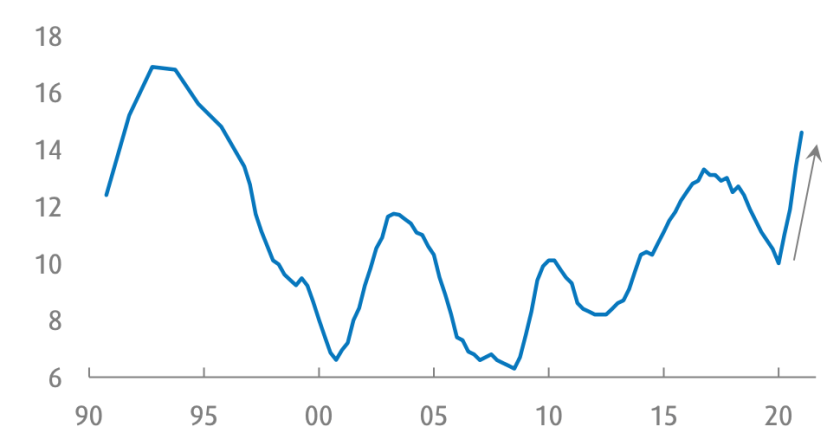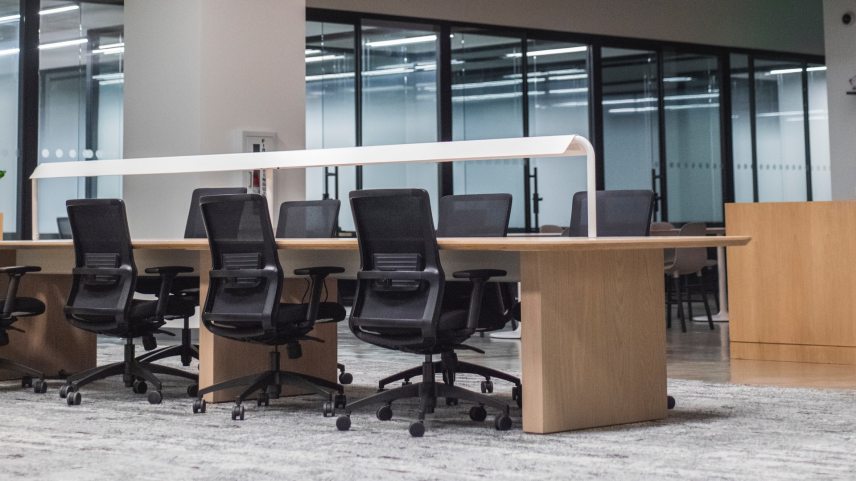Canadian companies have been scaling back on office space, reversing the pre-pandemic scramble that made it scarce. BMO senior economist Sal Guatieri looked at commercial office space in his latest note. The bank found long-term tenants locked into space are paying their bills just fine. However, companies that could, have been scaling back on the amount of office space they consume. The result is Canadian offices now have the highest vacancy rate in 25 years.
Canadian Office Vacancies Hit A Quarter Century High
Last quarter’s office vacancies reached the highest level in decades. The vacancy rate reached 14.6% in Q1 2021, up from 10.0% a year ago. Just before the pandemic, high demand for office space pushed vacancies across the country to the lowest level seen in years. Now the vacancy rate is at the highest level seen in over 25 years.
Canadian Office Vacancy Rate

Source: BMO; CBRE; Better Dwelling.
Toronto and Vancouver fared a little better, but still made very large jumps according to Guatieri’s analysis. Greater Toronto office vacancies “nearly doubled” to 12.4% in Q1 2021, the highest level since 2005. Metro Vancouver office vacancy rate hit 6.3%, about 2 points higher than a year before. Metro’s vacancy rate climbed by nearly 50%, but still remains the lowest of any city across Canada.
Canada’s Remaining Tenants Still Paying Their Bills
Office landlords aren’t seeing a big disruption from the tenants that remain, with few missed payments. Long-term leases and government assistance for tenants were a big reason few payments were missed. The economist said, “In Canada, despite sharply higher vacancy rates, office rents held up well in 2020, though landlords needed to provide concessions to retain tenants, according to CBRE.”
Lower Rents Needed In The Future, As Employers Reevaluate Space
Despite the resilience and stickiness of high rents based on the perspective “this is just temporary,” they may fall in the future. “As companies re-evaluate their work-from-home needs, some downsizing, repurposing, and repricing is expected,” he said.
Companies reevaluating just how much office space they need will make them reluctant to sign long-term leases. “Lower rents and larger concessions may be needed to entice companies to sign long-term leases.”
Office Spaces Will Return, But Maybe Not Where They Used To Be
The increase in office vacancies is going to have a big impact on urban economies that depend on these workers. In-person businesses clustered around office space hubs are going to see shifts in demand.
Guatieri said, “even a small change in the office/commuter crowd could have a meaningful impact.” Adding, “Still, large cities aren’t going away. Young people are drawn to urban amenities, while firms benefit from clustering effects from access.”
The economist doesn’t necessarily think that means the flight to small towns will reverse in the near term though. “The likely shift in office needs will favour buildings in regions with lower rents, easier commutes, and affordable housing.”
Like this post? Like us on Facebook for the next one in your feed.

Most office jobs can be done completely remotely. The pandemic just exposed this reality faster. Companies can save tons of money by not paying high rent. This is not an indication of economic downturn, its an indication of future trends.
If the government didn’t allow housing prices to drop during the pandemic, what makes you think when the entire world is recovering we will purposely tank our economy just so we can make housing more affordable?
So business bankruptcies were way down during the pandemic due to all the government money thrown around and a huge percentage of millennials yolo’d all their money into super expensive housing. Inflation is going way up, in the least short term, and that’s what all government policy is pushing (without wages going up, how is that different from a tax increase).
How does this not get worse when corporate bankruptcies go back to normal levels, and where’s the money in the system for people to feel comfortable or confident enough to start new businesses?
“what makes you think when the entire world is recovering we will purposely tank our economy just so we can make housing more affordable?”
The government erected supports to shore up the economy at a macro level. The by-product is that an already existing housing bubble in some markets got pumped up even aided by the lowest interest in history, and a slick RE marketing machine.
It’s all on plastic, the bills will be coming in, the ponies, houses, and other toys will have to go back.
The divorce battle will be about who gets stuck with the underwater mortgage.
I work for a large (tech-based) publically traded company in Toronto. They recently did a survey with all employees, here are the results.
4% prefer to work in the office full time
21% 3 days / week
42% 1-2 times/ week
33% come in just for meetings
If this is any taste of what the future for downtown, commercial real-estate looks like on a larger scale then there may be some serious changes ahead
Calgary has 2 office towers completely empty
I guess most of employees want to work at home, but employers want us to work in office, and they are hoping us go back to office after pandemic. So I guess the companies will decide but not employees decide if they are going back to office entirely or partially.
The data is showing literally the opposite of what you’re saying. Companies are scaling back office space, because it’s a huge overhead they don’t need.
The employees don’t rent the office space. The companies do.